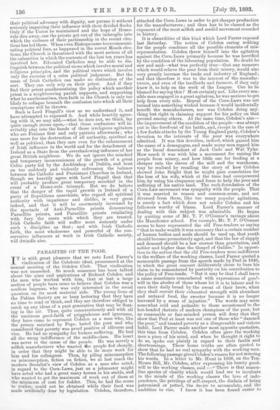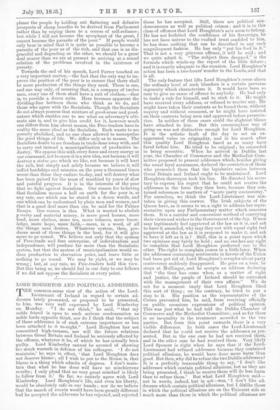PARASITES OF THE POOR.
IT is with great pleasure that we note Lord Farrer's vindication of the Cobdenic ideal, pronounced at the annual meeting of the Cobden Club. That vindication was not unneeded. So much nonsense has been talked about the aims and aspirations of Richard Cobden and the men who worked with him, that at last a large section of people have come to believe that Cobden was a soulless bagman, who was only interested in the social question on its most material side. The young lions of the Fabian Society are so busy lecturing that they have no time to read or think, and they are therefore obliged to catch up any ideas of a past generation that may be float- ing in the air. Thus, quite conscientiously and with all the unctuous good-faith of priggishness and ignorance, they have come to represent Cobden as a man who, like the person satirised by Pope, hated the poor and who considered that poverty was proof positive of idleness and vice. He had no sympathy for human suffering. He had all the smug indifference of the middle-class. His heart was never in the cause of the people. He was merely a selfish manufacturer who wanted the people fed cheaply, in order that they might be able to do more work for him and his colleagues. Thus, by piling misconception on misconception, fiction on fiction, we at last reach the modern Socialist's view of Cobden as a man who acted, in regard to the Corn-Laws, just as a jobmaster might have acted who had a great many horses in his stable, and who wanted to get the maximum of work out of them at the minimum of cost for fodder. This, he had the sense to realise, could not be obtained while their food was made artificially dear by legislation. Cobden, therefore, attacked the Corn-Laws in order to get cheaper production for the manufacturers ; and thus has to be classed as the exponent of the most selfish and sordid movement recorded in history.
It is absurdities of this kind which Lord Farrer exposed last Saturday. The notion of Cobden caring nothing for the people combines all the possible elements of mis- representation. Cobden threw himself into the agitation against the Corn-Laws primarily because he was horrified by the condition of the labouring population. No doubt he saw and said—what was perfectly true—that any measure which would relieve the poor from their misery, would also very greatly increase the trade and industry of England; and that therefore it was to the interest of the manufac- turers, and even of the landlords and farmers, if they only knew it, to help on the work of the League. Can he be blamed for saying this ? Most certainly. not. Like every sen- sible man engaged in a great agitation, he was anxious to get help from every side. Repeal of the Corn-Laws was not turned into something wicked because it would incidentally benefit the manufacturers, nor was Cobden doing any- thing but right in claiming support for his policy on that ground among others. At the same time, Cobden's aim— the improvement of the condition of the people—was always put in the forefront of his battle, and, except in the case of a few feeble attacks by the Young England party, Cobden's devotion to the interests of the poor was everywhere admitted. It was this devotion, indeed, which gained him the name of a demagogue, and made many men regard him as the lineal descendant of Jack Cade and Wat Tyler. How much it was with him a movement for raising the people from misery, and how little one for feeding at a cheaper rate the slaves of the mill and the warehouse, may be realised by recalling the story of how Cobden showed John Bright that he might gain consolation for the loss of his wife, which at the time had overpowered him, by using his eloquence and force to help the poor and suffering of his native land. The rock-foundation of the Corn-Law movement was sympathy with the people. That it was married to reason and common-sense, and not divorced from them, like too many popular agitations, is surely a fact which does not render Cobden and his followers worthy of blame. Lord Farrer's manner of dealing with this subject was admirable. He began by quoting some of Mr. T. P. O'Connor's ravings about the Manchester school. For example, Mr. T. P. O'Connor seems to have represented the old Free-traders as saying " that to make wealth it was necessary that a certain number of human bodies and souls should be used up, that youth should become prematurely aged, and that the law of supply and demand should be a law sterner than gravitation, and nobler and higher than the Gospel of Galilee." In opposi- tion to the notion that the old Free-traders were indifferent to the welfare of the working classes, Lord Farrer quoted a memorable passage from the speech made by Peel in 1846, in which the great convert deliberately chose to base his claim to be remembered by posterity on his contribution to the policy of Free-trade. " But it may be that I shall leave a name sometimes remembered with expressions of good- will in the abodes of those whose lot it is to labour and to earn their daily bread by the sweat of their brow, when they shall recruit their exhausted strength with abundant and untaxed food, the sweeter because it is no longer leavened by a sense of injustice." The words may seem somewhat cold and pedantic to those accustomed to the hot-headed rhetoric of modern champions of the poor, but no reasonable or fair-minded person will deny that they show that Peel at least was not one of those who " damned the poor," and treated poverty as a disagreeable and vicious habit. Lord Farrer made another most apposite quotation, this time from Cobden. Cobden often gave the working men a piece of his mind, and when he thought it right to do so, spoke out plainly in regard to their faults and shortcomings. These home truths are often quoted to show that he had no real sympathy with the working men. The following passage gives Cobden's reason for not mincing his words. In a letter to Mr. Hunt in 1836, on the Ten- Hours Bill, Mr. Cobden, after expressing his hearty good- will to the working classes, said :—" There is that mascu- line species of charity which would lead me to inculcate in the minds of the working classes the love of inde- pendence, the privilege of self-respect, the disdain of being patronised or petted, the desire to accumulate, and the ambition to rise. I know it has been found easier to please the people by holding out flattering and delusive prospects of cheap benefits to be derived from Parliament rather than by urging them to a course of self-reliance ; but while I will not become the sycophant of the great, I cannot become the parasite of the poor." If people would only bear in mind that it is quite as possible to become a parasite of the poor as of the rich, and that one is as dis- graceful and degrading as the other, we should be a great deal nearer than we are at present to arriving at a sound solution of the problems involved in the existence of poverty. Towards the end of his speech, Lord Farrar touched on a very important matter,—the fact that the only way to im- prove the position of the poor is to ensure that there shall be more production of the things they need. There is one, and one way only, of securing that, in a company of twelve men, every one of them shall have a suit of clothes,—that is, to provide a dozen suits. Here becomes apparent the dividing-line between those who think as we do, and those who agree with the Socialists. Though the Socialists do not always possess that mixture of good-sense and good- nature which enables one to see what an adversary's ulti- mate aim is, and to give him credit for it, however much one differs from him about means, the Free-traders have in reality the same ideal as the Socialists. Each wants to see poverty abolished, and no one class allowed to monopolise the good things of life. We differ only as to means. The Socialists desire to see freedom in trade done away with, and to carry out instead a municipalisation of productive in- dustry. We oppose this with every force and every energy at our command, not because it is a new idea, not because it will destroy a status quo which we like, not because it will hurt the rich, but simply and solely because we believe it will inflict hardships and miseries on the poor a thousand times worse than those they endure to-day, and will destroy what has been gained for the mass of mankind by years of slow and painful progress. It is in the interests of the poor that we fight against Socialism. Our reason for believing that Socialism means a hell on earth for the poor is, at any rate, one which can be stated in a dozen words, and one which can be understood by plain men and women, and that is a good deal more than can be said for the Fabian Essays. Our reason is this. What is wanted to abolish p )verty and material misery, is more good houses, more food, more clothes, more tea, more tobacco, more know- ledge, more hope, more faith,—more, in a word, of all the things man desires. Whatever system, then, pro- duces most of these things is the best, for it will give more to go round. We believe not only that the system of Free-trade and free enterprise, of individualism and independence, will produce far more than the Socialistic system, but that the system of municipalisation would re- duce production to starvation point, and leave little or nothing to go round. We may be right, or we may be wrong ; but, at any rate, we Free-traders hold this view. But this being so, we should fail in our duty to our fellows if we did not oppose the Socialists at every point.



































 Previous page
Previous page